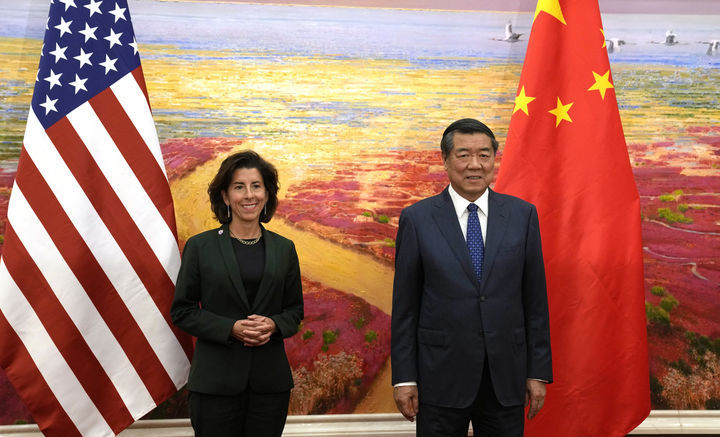 |
US Secretary of Commerce Gina Raimondo (left) and Chinese Vice Premier Hu Jintao pose for a photo ahead of their meeting at the Great Hall of the People in Beijing, Aug. 29. (Newsis) |
Starting in the second half of 2026, the US will ban the sale of connected cars using Chinese-made software, with further restrictions on hardware to begin in 2029, a move that will pressure global automakers, including South Korea’s Hyundai Motor and Kia, to diversify their supply chains.
On Monday, the US Department of Commerce’s Bureau of Industry and Security announced a proposed rule that would prohibit the sale and import of connected vehicles containing Chinese or Russian software starting with model year 2027 and hardware by model year 2030. These bans will apply to software from mid-2026 and hardware from mid-2029, with non-model-year vehicles subject to the rules starting in January 2029.
Connected cars, broadly defined, are vehicles that link to a communication network and offer various information technology services, including autonomous driving features. The US government has introduced these restrictions due to national security concerns, citing the potential for Chinese-made technologies in connected cars to be hacked, allowing sensitive data to be harvested, or even enabling remote control of vehicles to cause disruption.
“Today's vehicles are equipped with significant technology connected to the internet -- cameras, microphones, GPS tracking, and more. This creates national security vulnerabilities that must be addressed, which is why we're taking proactive measures to limit the use of Chinese and Russian technologies in these vehicles,” US Secretary of Commerce Gina Raimondo said in a statement Monday.
The Korean auto industry, which includes major players like Hyundai Motor and Kia, is expected to feel the ripple effects of the US decision across the global supply chain, as most modern vehicles feature extensive connectivity functions. While the impact on software may be limited due to Korea’s relatively low reliance on Chinese-made software, hardware components remain a concern, given Korea's dependence on Chinese suppliers for certain parts.
“Software components in our connected cars are minimally sourced from China, so we don't foresee any immediate disruption from these new US regulations,” an official from Hyundai Motor Group said.
The hardware supply chain, however, is more vulnerable. An industry insider pointed out that while Korean automakers use little Chinese software, “There's still a reliance on Chinese hardware, such as wiring harnesses.”
Wiring harnesses, essential for transmitting electrical signals within a vehicle, have historically been sourced from China due to lower labor costs. This reliance became apparent during the early stages of the COVID-19 pandemic when lockdowns in China caused severe disruptions to the global supply of these parts.
The US sanctions on connected vehicle technology give Korean automakers roughly two years to adjust for software compliance and five years for hardware before the bans fully take effect.
In response to the evolving regulations, experts have urged the Korean government and automotive industry to actively engage in negotiations with US authorities to reduce the potential fallout. Earlier this year, the Korea Automobile & Mobility Association submitted public comments to the US Department of Commerce, advocating for a clearer definition of “connected cars” to avoid overreach.
“The entire supply chain, from automakers to parts manufacturers, is deeply interconnected. It will be extremely difficult for Korean companies to avoid the repercussions of this ban. The Korean government and industry associations need to continue to use their influence to negotiate favorable terms and minimize damage,” said researcher Jang Hong-chang from the Korea Automotive Technology Institute.
KAMA has committed to working closely with both the government and automotive companies. “We are committed to taking a step-by-step approach to protect the interests of the Korean auto industry while meeting US regulatory requirements,” a KAMA official said.





![[Herald Interview] How Gopizza got big in India](http://res.heraldm.com/phpwas/restmb_idxmake.php?idx=644&simg=/content/image/2024/11/20/20241120050057_0.jpg)

